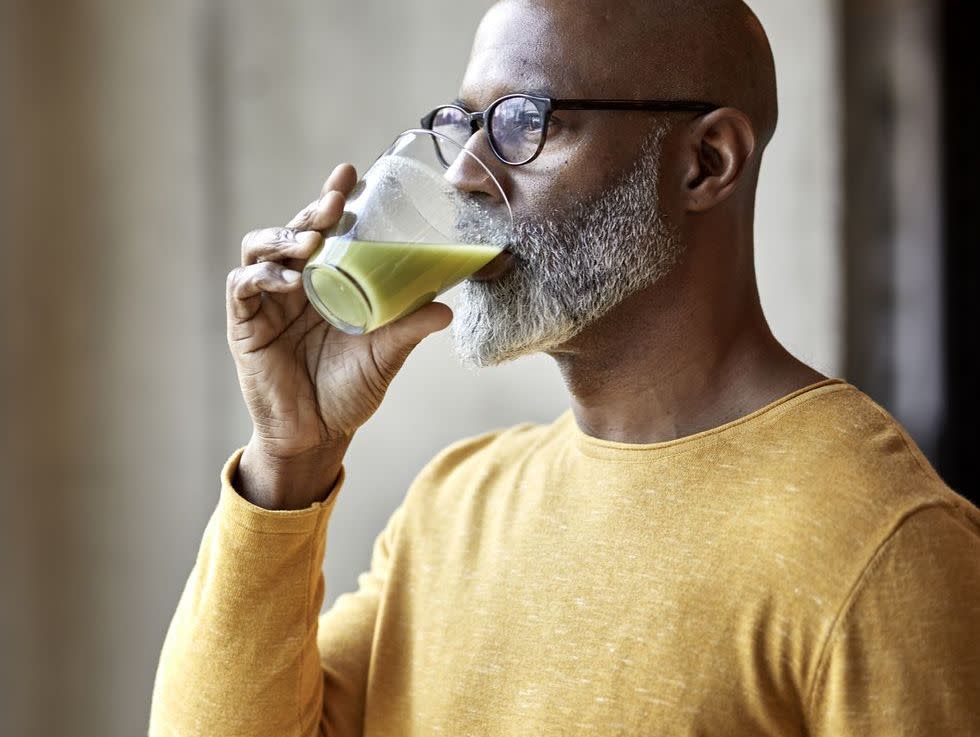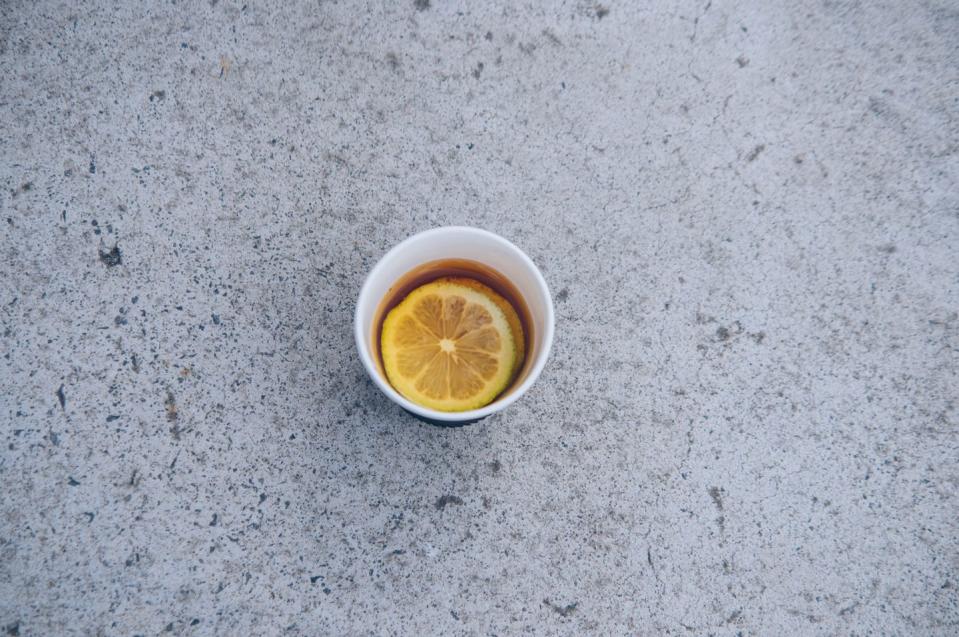Bored of water? 14 refreshing healthy drinks to quench your thirst

We all know that water is good for us, while sugary drinks, like soft drinks and energy drinks, should generally be avoided. But what about healthy drinks that aren’t water?
Walk through any supermarket and you’ll find aisles upon aisles of so-called healthy drinks that are actually filled with sugar, additives and empty calories. That’s not to necessarily say you should sip water all day. There are plenty of genuinely healthful and natural beverages that also come with a dose of vitamins, minerals and fibre.
When thirst strikes and water just won’t seem to quench it, consider reaching for one of the healthy drinks below instead. Jenny Logan, nutritionist at Nature’s Aid, talks us through the nutritional composition of each liquid, and explains how each one can help boost your health:
1. Green tea
Green tea is regarded as one of the healthiest beverages on the planet. It has been linked to all manner of benefits, from boosting brain function – thanks to its high caffeine and L-theanine content – to reducing blood sugar levels.
‘Green tea is rich in polyphenol antioxidants,’ says Logan. ‘It has been linked in research to improved metabolism and increased fat burning. The most potent compound in green tea is called epigallocatechin-3-gallate (EGCG).’
The tea you use – fresh versus dried – temperature and steeping time all have a significant effect on the antioxidant levels of green tea. A warm (not boiling) cup brewed for two to three minutes will bring the most benefits.
2. Beetroot juice
Beetroot juice is jam-packed with essential vitamins and minerals – including vitamin B9, manganese, potassium, iron, and vitamin C – as well as several potent antioxidants and plant compounds.
‘Beetroots contain nitrates, which convert into nitric oxide in the body,’ says Logan. ‘Nitric oxide can help to relax the blood vessels. This in turn has been shown to be useful for people with high blood pressure, and for athletes looking to improve physical performance.’
You could buy a pre-pressed juice from the supermarket or blitz up a beetroot smoothie at home with lemon, ginger and apple.
3. Lemon water
Many people swear by starting their day with a cup of lemon water. While there’s little in the way of scientific research specifically on lemon water, the components – lemons and water – are certainly healthful.
‘Many of the claims around the benefits of lemon water are anecdotal,’ says Logan. ‘However, for those that add plenty of lemon, it is a good source of vitamin C, which is required for healthy skin and immunity.’
4. Cranberry juice
Unsweetened cranberry juice is full of vitamins and minerals, including vitamin E, vitamin C, and copper, as well as various phytonutrients that give cranberries their anti-inflammatory properties.
Drinking three glasses a day significantly raises levels of ‘good cholesterol’ in the blood and increases plasma antioxidant levels, reducing the risk of heart disease, according to research by the American Chemical Society.
And that’s not all. ‘Cranberry juice can help to support urinary tract health, and many women use it to try and prevent cystitis,’ says Logan. ‘Look for a no-added-sugar version.’
5. Coconut water
Coconut water has a sweet, nutty taste and is high in healthful antioxidants. This clear liquid is found inside young, green coconuts, and helps nourish the fruit as it grows.
‘Coconut water is a natural source of electrolytes, including sodium, potassium, magnesium, and calcium, meaning it is a great way to rehydrate,’ says Logan.
Known as Mother Nature’s sports drink, coconut water contains five times more potassium than Gatorade or Powerade, according to research by the American Chemical Society.
6. Pomegranate juice
‘Pomegranate juice is rich in antioxidants,’ says Logan. ‘Research has indicated that it may specifically be helpful in supporting prostate health.’
Pomegranate juice contains far higher levels of antioxidants than most other fruit juices – specifically punicalagins and punicic acid, which are extremely potent.
Thanks to its high punicalagin content, pomegranate juice has been shown to reduce inflammation in people with diabetes. Just 250ml per day reduced two major inflammatory markers by a third, research by the Shahid Beheshti University of Medical Sciences found.
Preliminary research indicates that pomegranate juice can potentially inhibit cancer growth in men with prostate cancer.

7. Black coffee
The health benefits of black coffee have been widely documented, due to its high levels of antioxidants and beneficial nutrients, including vitamin B2, vitamin B3, vitamin B5, manganese, potassium, and magnesium.
‘Coffee contains caffeine which can help to provide a physical and mental boost,’ says Logan. ‘Research has indicated that black coffee could also help increase fat burning and reduce the risk of cognitive decline.’
Furthermore, studies have consistently shown that coffee drinkers have a much lower risk of several serious diseases, including Alzheimer’s, depression and cancer.
8. Kombucha
Kombucha is made by adding specific strains of bacteria, yeast and sugar to black or green tea, and then leaving it to ferment for a week or longer.
For this reason, it contains the same bioactive compounds found in tea – such as polyphenols – with the added benefit of gut-healthy probiotics. It’s also high in acetic acid, which has strong antibacterial properties.
‘This fermented drink is rich in probiotic bacteria which help to support the health of our internal microbiome,’ says Logan. ‘Avoid those with added sugar.’
9. Peppermint tea
Peppermint leaves contain several key essential oils – including menthol, menthone and limonene – as well as micronutrients and plant compounds that support heart health, calm the nervous system, and help to relieve gas, bloating and indigestion.
‘A refreshing drink that is naturally caffeine and calorie free, peppermint tea may also help to soothe the digestive system and will help to naturally freshen breath,’ says Logan.
10. Hot chocolate
Believe it or not, hot chocolate can be healthful – and not just because it nourishes the soul. Just skip the instant stuff.
‘If made with 100 per cent cocoa mixed with warm milk, rather than one of the instant versions, hot chocolate will provide antioxidants known as polyphenols, which could help to support a healthy heart,’ says Logan.
Indeed, cocoa is one of the richest sources of polyphenols – especially flavanols, which have impressive antioxidant and anti-inflammatory effects.
11. Ginger tea
An ancient herbal remedy for a whole host of ailments, ginger contains a huge variety of healthful plant compounds – the main one being gingerol, which gives the spice its pungent taste.
‘Ginger is a natural anti-inflammatory,’ says Logan. ‘It’s also well known for its ability to reduce nausea and inhibit vomiting. It is a great one for anyone suffering with nausea and sickness, including expectant mums.’
It’s also full of vitamins and minerals, including vitamin C, iron, calcium and phosphorus, and contains very high levels of antioxidants.
12. Tomato juice
Tomato juice is highly nutritious – in fact, just one 250ml cup of tomato juice nearly covers your daily needs for vitamin C, and more than one fifth of your vitamin A requirements. It’s also high in lycopene, another powerful antioxidant known for fighting inflammation.
‘Tomato juice is a great source of lycopene,’ says Logan. ‘Lycopene has been linked to a healthy heart and a healthy prostate. Be careful though – get one that does not have added salt or sugar.’
13. Infused water
Why not try infusing filtered water with fruits, veggies, or fresh herbs? Mint and cucumber, mango and ginger, and strawberry and basil all pair well. You could even use sparkling water if you prefer the fizz.
‘Firstly, for many people infusing water with cucumber and mint makes it taste better, which leads them to hydrate better,’ says Logan. ‘The additional flavour can provide the satiation which stops them reaching for that snack they are trying to cut out.’
14. Sea buckthorn juice
Sea buckthorn juice is made from the tart, sweet berries of the sea buckthorn plant, a spiny shrub native to central Asia that now grows wild around Britain’s coast (hence the name!) and is now finding its place on supermarket shelves.
Sea buckthorn is one of the only plant foods known to provide all four omega fatty acids: omega-3, omega-6, omega-7 and omega-9, and ‘is a great natural source of vitamin C and vitamin A,’ says Logan.
Last updated: 24-08-2020
You Might Also Like


